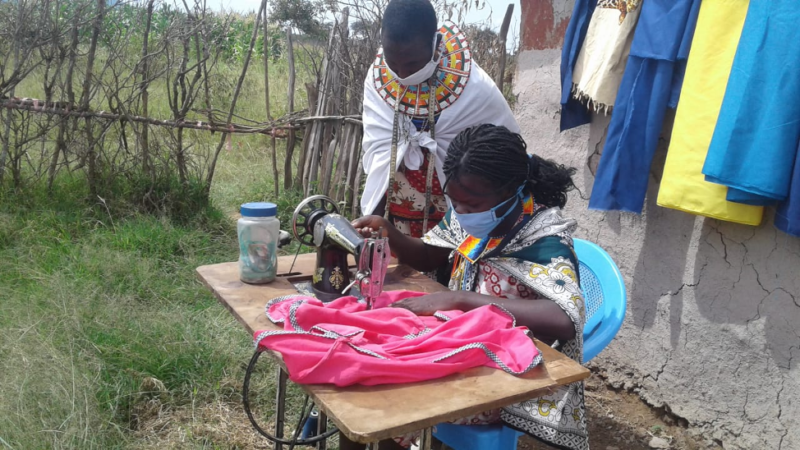Three women in Samburu County, northwestern Kenya, started a tailoring business to diversify their income streams and increase their resilience to the impacts of both coronavirus and the climate crisis.
Like many pastoralists in Northern Kenya, these women traditionally depend on livestock markets to make a living, but the government closed them down after the outbreak of Covid-19. To adapt, the group invested in a second-hand sewing machine and are now making face masks, which they are selling across the region.
In pivoting to the new face mask business, the women have increased their resilience to both Covid-19 and the climate crisis – they are now able to make an income without waiting for the government to reopen the livestock markets, and they are less dependent on the rain for crop production.
By adapting to the pandemic, the women have placed themselves at the centre of a thriving and necessary income stream that is independent of the climate crisis.
The new venture has been made possible, in part, by The BOMA Project, a 13-year-old development organisation that empowers women in the drylands of Africa to become entrepreneurs.
The project was originally intended to build resilience to the climate crisis by developing skills and businesses that help lift communities out of poverty, but this has also helped increase resilience to the pandemic.
Under its Rural Entrepreneurship Access Program (REAP), BOMA employs local “mentors” who identify families that are most in need. The REAP mentors then train women from those families in business skills, advise them financially, and give them seed grants to launch new businesses.
Titoo Lenkolos, one of the three members of the face mask venture and a mother of five, lives in the emerging livestock market town of Lekuru and has been coached by BOMA’s mentors.
“BOMA encourages us to put a portion of our money away in savings,” Lenkolos said. “We were able to draw on those savings to purchase a sewing machine. The business has been incredibly successful, and we’ve been able to generate sufficient income to feed our children and send them to school.”
Beyond the family resilience that comes with savings and education, business success also gives REAP participants a greater stake in the social and political fabric of their community – and the confidence to engage in activities and decisions that affect more than just their households.
BOMA is using a grant from the Climate Justice Resilience Fund to train women entrepreneurs to take part in local committees that govern water use, rangeland management, and the regulation of firewood collection.
By influencing natural resource management practices, BOMA’s participants support both their own businesses and their communities’ resilience.
“Empowering our participants to start small businesses to earn income and have a voice shaping government policies related to the management of natural resources has such an impact on their lives. It is key to the long-term sustainability of the program and to the resiliency of the livelihoods that we support,” said Sam Owilly, BOMA’s Kenya programme director.
Grace Nakera Endnog, a mother of five children who lives in Ngaremara ward, Isiolo County, learned how to run a business and save up for emergencies from a BOMA mentor, and used the new know-how to set up a convenience store. While the store initially suffered during the pandemic, Grace was able to reposition the store into a bakery.
“I decided to change and enter a different business,” she said, “I started making and selling mandazi donuts. There’s always something you can do. No matter, where you are or what you do, you have to be innovative.”
That goes for both Covid-19 and climate change.
“We’ve had severe climate events from droughts to floods and locust swarms,” said Lenkolos. “Being flexible is key to survival in our part of the world.”
This post was sponsored by the Climate Justice Resilience Fund. See our editorial guidelines for what this means.
